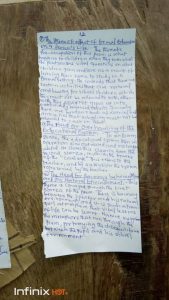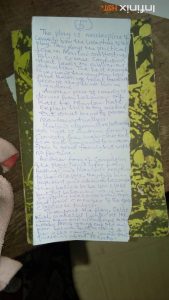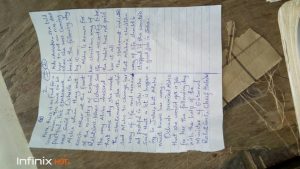WWW.SOLUTIONFANS.COM - MASTER OF ALL EXAM RUNS
The Themes in Piano and Drums
NO9
i) The Theme of Culture / Conflict
Culture in Piano and Drums by Gabriel Okara In the poem “Piano and Drums” the poet Gabriel Okara depicts and contrasts two different cultures through symbolism of pianos and drums. The Poem is divided into four stanzas. The first two stanzas represent the “drum” culture and the second two stanzas show the “piano” culture. The description of the drums is in two stanzas, but is one sentence long. The first line of the first stanza: ‘When at break of day at a riverside’ Uses trochees to emphasize the deliberate broken rhythm. The stanza has savage words, “bleeding flesh,” “urgent raw,” “leopard snarling,” “spears poised,” to show that this is a primitive culture, one which has dependency on the environment, as is represented by the “hunters crouch with spears poised.” The environment in this culture is physically dangerous, surrounded by wild animals. Drums here are a way of communication, and “jungle drums telegraphing the mystic rhythm, urgent, raw…” shows the way of life in this culture. This is life which is simple, near the beginnings of man. The stanza … … middle of paper … …with one another, with Drums illustrating primitive behaviour, and a savage, dangerous culture. The connotations of the piano are complex and technical. The piano uses significantly different word sounds, showing that it is learnt, westernized and intricate compared to the drums which is instinctive and naturally acquired, and simple. The poem uses no set rhyme pattern which suits the poem as it has an undecided effect, emphasizing the confusion of the persona over his future. The Themes in Piano and Drums
ii) The Theme of Innocence
The theme of innocence in the poem is explored in the poem is explored in the depiction of african culture, from the very first line of the poem where we are told that the events take place “at break of day”, the idea of innocence is already implied. This is because the day is fresh and uncontaminated by other activities or sounds. The sound heard from the jungle drums are therefore pure and not corrupt, the poem also invokes the idea of innocence. The Themes in Piano and Drums
iii) The Theme of Dilemma
The theme of dile also features in the poem, while the poet speaks glowingly of african culture, he also finng european culture, despite its shortcomings, seductive. Thus he is unable to dwcide whether to let go of the inherited culture or embrace the new one this is the plight of many educated africans today . many have however resolved this delimma by taking from the two cultures in what has come to be know as cultual syncretism
iv) Childhood reminiscence and its effect
The poem speaker was reminded of his/her “primal youth and the beginning” through the quietness of the early morningriver and the echoing forest. While at the riverside, the poem speaker could “hear jungle drums telegraphing/the mystic rhythm…” (Line 2 & 3) and other things like panther, leopard, hunters crouching with poised spears, etc added to his/her memory.
The poem speaker revealed in stanza 2, the effect
such reminiscence brought to his/her memory of sitting “in my mother’s lap a suckling”, “walking simple paths with no innovations”, and groping in green leaves with wild flowers in naked hurrying feet.
(1)
A madman is outsider. We are told that he tattered and carrying heavy bundles of tightly wrapped pieces of junk dropping over his face.He shouts and abuses nobody in particular.He describes himself has “rich man” even though he has not stolen anybody’s property.I no be thief because i dey satisfy for wetin i get.”I be rich man as you as you see me”.A lady passes by and calls him of disturbing the neighbourhood with your house.The madman unleashes a series of nonsense talk as such as describing the lady as his “darling wife” who agreed to marry him when he was poor,”but now i rich she no longer wan me again”.He equally announces the improbable when he says, “i go go to Mr president and ask him to appoint me president of this country”.He wants the ministers to work in the local goment and the councillors to be de ambassador” The madman and his load of bits and pieces of junk” on his head symbolize Jaccasa. What the nationals fails to reckon with namely moral rectitude is important to the supposedly mad person. What the madman utters,even if some of them appear nonsensical,makes some meaning to ACP Yakubu.
======================================
(5)
The play is masterpiece of comedy,from the inception of the play.Tony,plays the practical joke on marlow and Hastings which create confusion that leads to hillarious situation.The best example is perhapsthe way Marlow and Hastings treat Hardcastle because they think him a landlord.
Another piece of Comedy is derives from behaviour of Kate to Marlow.Kate exploits this too try to find out what kind of person Marlow actually is.Marlow’s dynamic relationship with Kate is another form of comedy from higher class Kate to a poor barmaid to a woman from a good family but with no fortune.
Another form of comedy in the play could be from Hastings and Marlow’s reaction to Hardcastle,they find him impudent and absurd because they believe to be low class but this behaviour would be perfeclty reasonable and expected from a member of the upper class as he truly is.
Throughout the play,Goldsmith makes us laugh at the way men and women as father,mother,lovers,young and old and poor behaviour but in doing he also raises important question about society.
======================================
(12)
(i) The the of effect of formal education on a person’s life:
The thematic pre-occupation of this poem is what happens to children when they enter school. The poet raises vital questions on what children gain and lose as aresult of leaving their home to study in a formal setting. He contends that there are certain activities that are natural and healthy for school children which they must not be allowed to miss, otherwise they would not grow up into emotionally balanced adults. Similarly, there are burdens such as worriess and anxieties that schooling must not be allowed to cast on them.
(ii) The need for overhauling of the educational system:
To William Blake, the educational system then in operation was outdated and no longer useful. He states this clearly from the second stanza, in which he speaks of “the cruel eye”. This refers to the teacher and by extension of the system represented by the teacher.
(iii) The need for harmony between man and his natural environment:
Theme is conveyed through the first stanza of the poem. There is harmony between the speaker and his natural environment, and it is such a tranquil atmosphere that vital lessons of life can be learnt. nature supplies the metaphors that run through the poem, portraying the disequilibrium between the pupil and his school environment



307 total views, 1 views today
also don't forget to leave a Reply, we would very MUCH appreciate Your Comments On This Post Below. Thanks!

